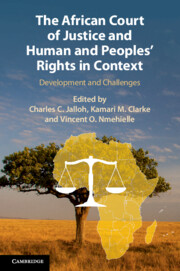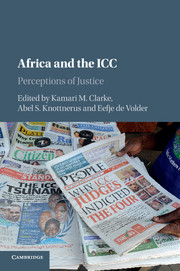30 results
Index
-
- Book:
- The African Court of Justice and Human and Peoples' Rights in Context
- Published online:
- 02 May 2019
- Print publication:
- 16 May 2019, pp 1125-1168
-
- Chapter
-
- You have access
- Open access
- HTML
- Export citation
3 - Peace and ‘Justice’ Sequencing in Management of Violence in the Malabo Protocol for the African Court
- from Part I - The Wider Context of Transitional Justice in Africa
-
-
- Book:
- The African Court of Justice and Human and Peoples' Rights in Context
- Published online:
- 02 May 2019
- Print publication:
- 16 May 2019, pp 109-146
-
- Chapter
-
- You have access
- Open access
- HTML
- Export citation
Part IV - The General Jurisdiction of the African Court
-
- Book:
- The African Court of Justice and Human and Peoples' Rights in Context
- Published online:
- 02 May 2019
- Print publication:
- 16 May 2019, pp 1021-1054
-
- Chapter
-
- You have access
- Open access
- HTML
- Export citation
Part V - Funding the African Court and the Role of Civil Society
-
- Book:
- The African Court of Justice and Human and Peoples' Rights in Context
- Published online:
- 02 May 2019
- Print publication:
- 16 May 2019, pp 1055-1124
-
- Chapter
-
- You have access
- Open access
- HTML
- Export citation
Preface
-
- Book:
- The African Court of Justice and Human and Peoples' Rights in Context
- Published online:
- 02 May 2019
- Print publication:
- 16 May 2019, pp xix-xxii
-
- Chapter
-
- You have access
- Open access
- HTML
- Export citation
1 - Introduction
-
-
- Book:
- The African Court of Justice and Human and Peoples' Rights in Context
- Published online:
- 02 May 2019
- Print publication:
- 16 May 2019, pp 1-54
-
- Chapter
-
- You have access
- Open access
- HTML
- Export citation
Contents
-
- Book:
- The African Court of Justice and Human and Peoples' Rights in Context
- Published online:
- 02 May 2019
- Print publication:
- 16 May 2019, pp v-x
-
- Chapter
-
- You have access
- Open access
- HTML
- Export citation
Contributors
-
- Book:
- The African Court of Justice and Human and Peoples' Rights in Context
- Published online:
- 02 May 2019
- Print publication:
- 16 May 2019, pp xi-xviii
-
- Chapter
-
- You have access
- Open access
- HTML
- Export citation
Abbreviations
-
- Book:
- The African Court of Justice and Human and Peoples' Rights in Context
- Published online:
- 02 May 2019
- Print publication:
- 16 May 2019, pp xxiii-xxx
-
- Chapter
-
- You have access
- Open access
- HTML
- Export citation
B - Institutional and Procedural Issues
- from Part II - The Criminal Law Jurisdiction of the African Court
-
- Book:
- The African Court of Justice and Human and Peoples' Rights in Context
- Published online:
- 02 May 2019
- Print publication:
- 16 May 2019, pp 643-740
-
- Chapter
-
- You have access
- Open access
- HTML
- Export citation
Part III - The Human Rights Jurisdiction of the African Court
-
- Book:
- The African Court of Justice and Human and Peoples' Rights in Context
- Published online:
- 02 May 2019
- Print publication:
- 16 May 2019, pp 963-1020
-
- Chapter
-
- You have access
- Open access
- HTML
- Export citation
Part I - The Wider Context of Transitional Justice in Africa
-
- Book:
- The African Court of Justice and Human and Peoples' Rights in Context
- Published online:
- 02 May 2019
- Print publication:
- 16 May 2019, pp 55-220
-
- Chapter
-
- You have access
- Open access
- HTML
- Export citation
A - The Crimes
- from Part II - The Criminal Law Jurisdiction of the African Court
-
- Book:
- The African Court of Justice and Human and Peoples' Rights in Context
- Published online:
- 02 May 2019
- Print publication:
- 16 May 2019, pp 223-642
-
- Chapter
-
- You have access
- Open access
- HTML
- Export citation
Part II - The Criminal Law Jurisdiction of the African Court
-
- Book:
- The African Court of Justice and Human and Peoples' Rights in Context
- Published online:
- 02 May 2019
- Print publication:
- 16 May 2019, pp 221-962
-
- Chapter
-
- You have access
- Open access
- HTML
- Export citation
Copyright page
-
- Book:
- The African Court of Justice and Human and Peoples' Rights in Context
- Published online:
- 02 May 2019
- Print publication:
- 16 May 2019, pp iv-iv
-
- Chapter
-
- You have access
- Open access
- HTML
- Export citation
C - Modes of Participation, Immunity, Defences, Sentences and Reparations
- from Part II - The Criminal Law Jurisdiction of the African Court
-
- Book:
- The African Court of Justice and Human and Peoples' Rights in Context
- Published online:
- 02 May 2019
- Print publication:
- 16 May 2019, pp 741-742
-
- Chapter
-
- You have access
- Open access
- HTML
- Export citation

The African Court of Justice and Human and Peoples' Rights in Context
- Development and Challenges
-
- Published online:
- 02 May 2019
- Print publication:
- 16 May 2019
-
- Book
-
- You have access
- Open access
- Export citation
5 - International Justice and the Politics of Sentimentality
- from Part I - The Origins of a Fractious Relationship
-
-
- Book:
- Africa and the ICC
- Published online:
- 27 October 2016
- Print publication:
- 27 October 2016, pp 78-104
-
- Chapter
- Export citation
17 - Epilogue
- from Part IV - Beyond the ICC
-
-
- Book:
- Africa and the ICC
- Published online:
- 27 October 2016
- Print publication:
- 27 October 2016, pp 437-444
-
- Chapter
- Export citation

Africa and the ICC
- Perceptions of Justice
-
- Published online:
- 27 October 2016
- Print publication:
- 27 October 2016



